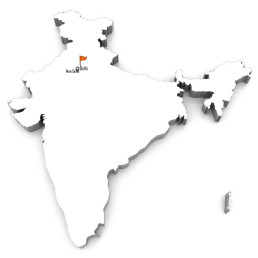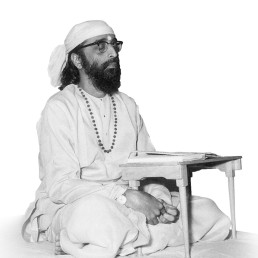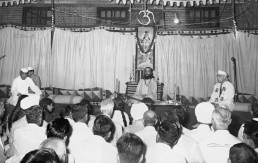
Jnana Yajna 14

Year & Dates:
October 30, 1955 to November 30, 1955

Yajna Topic:
Bhagavad Gita- Chapters 3 & 4

Place:
Delhi University, New Delhi, India.
It was the first time that the Convocation Hall in Delhi University had been transformed into a site of spiritual satsanga for thirty continuous days. Young and old had gathered enthusiastically in an academic setting to learn the Highest Knowledge from a contemporary sage. Swami Chinmayananda had already caught the attention of the intelligent youth with His call to independently estimate the Science of Religion. The way He invited them in His opening day address to “chalk out for themselves the right way of application of the sacred values in the daily scheme of their lives” showed His confidence in their ability to reflect.
Inspired Call to Action
Continuing with the Gita Jnana Yajna series that began in the Modern School, Delhi, Pujya Gurudev now launched into the uplifting verses of Chapters 3 & 4 of the Bhagavad Gita. Sharing the wisdom of Karma Yoga (Chapter 3), He emphasized on the path of right, dedicated action as the means for self-development and preparation for Knowledge. Then, with fluent excellence, Pujya Gurudev unfolded the path of greater Truth and Knowledge in chapter 4, ‘Jnana Yoga.’
A notable event that happened during the 14th yajna was Pujya Gurudev’s address during the All India Vedanta Sammelana at Amritsar. He left Delhi on the night of November 12, 1955, and traveled all night by car across 300 miles to roar to about eight to ten thousand people, especially the youth, about the importance of living Vedanta. Right after that stirring speech, Pujya Gurudev dashed back to Delhi University in time to continue His 6 pm Gita discourse in the joyful glow of the Deepavali lamps on November 13. Modeling the way to bring Gita to life, every action of Pujya Gurudev was selfless and stimulating, steeped in Knowledge.
In Admiration
A devotee of Delhi recalls, “Swami Chinmayananda’s discourses on Gita and various Upanishads are narrated in such a masterly and convincing style, that they penetrate our hearts and minds deeply and thus have a lasting effect on ourselves. The various stanzas are taken up one by one by him, and their meanings explained in detail with various present day examples in a simple and beautiful style. He sits as it were on the throne of spiritual and knowledge and distributes the flowers and honey of wisdom in handfuls.”

“Think,” Says Pujya Gurudev
The method of controlling the mind by the body is Karma Yoga, and it is fit for those who are extremely body-conscious and world-conscious. Controlling the mind from the mind is Bhakti Yoga, and it is conducive to those who are of an emotional temperament. The method of controlling the mind from the intellectual zone is called Jnana Yoga which can appeal to all intellectuals.
But whatever be the path purchased, and whatever be the type to which the seekers belong, the ultimate experience of the Spiritual Perfection gained by every one of them, at the moment of illumination, is one and the same. This is an incontrovertible fact inasmuch as the mystical literature of the world reads as though every saint has borrowed and copies from all the earlier Masters across the world!!
Tyagi Magazine- March 15, 1956, p. 28
The significance of the stanza as “a prayer to be said before food” is amply self-evident. To live we must eat. Food is an unavoidable necessity of existence. Whatever be the type of food, when one is hungry one will enjoy one’s meals. The suggestion is that even at this moment of natural enjoyment we are not to forget the great Truth that it is Brahman eating Brahman, and that during our meals we are offering to Brahman the food that is Brahman invoking nothing but the grace of Brahman. To keep this idea constantly in the mind is to get ourselves perfectly detached from the enjoyment and raise ourselves to a greater and endless beatitude which is the reward of the Super-manhood.
Tyagi Magazine- April 15, 1956 V. 24 Ch. 4, p. 13
Have courage to follow Dharma?
Explore the enigmatic realm of divine incarnations, a timeless mystery that has captivated the hearts of seekers throughout the ages. Discover the sacred promise made by Lord Narayana to secure the victory of righteousness, and unravel the profound significance of divine intervention as a guiding light in times of moral crisis. Join us in this exploration of spirituality and delve into the eternal wisdom that reveals the divine’s role in upholding righteousness across the ages.
